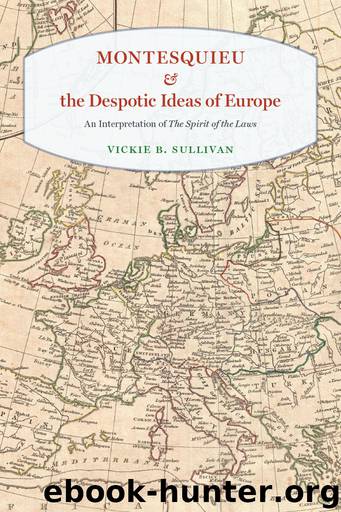Montesquieu and the Despotic Ideas of Europe by Vickie B. Sullivan

Author:Vickie B. Sullivan [Sullivan, Vickie B.]
Language: eng
Format: epub
ISBN: 978-0-226-48307-8
Publisher: University of Chicago Press
Published: 2017-06-25T16:00:00+00:00
Plato as a politique grec and Montesquieu as a Modern Political Man
Early in The Spirit of the Laws, when Montesquieu sets out the principles of the various regimes, he contrasts the “politiques grecs,” who recognized only virtue as the means to sustain popular government, with those “d’aujourd’hui,” who “speak to us only of manufacturing, commerce, finance, wealth, and even luxury” (3.3, 22–23; OC 2: 252). He contrasts the ancients with the moderns and ascribes no particular identities to either set of men. He does not indicate here whether the political men of these two different eras are legislators, political rulers, or political commentators. Of course, he has an obvious affinity with the modern ones, as he speaks at length of commerce and finance, and certainly mentions wealth and luxury frequently. Indeed, when later in the work he brings forward commerce as a transformative force, he pointedly notes Plato’s opposition to commerce in the name of pure mores. Still later in the work, Montesquieu resumes his discussion of the Greek political men, and in this particular discussion he makes it quite clear that he includes Plato among their number. Montesquieu so identifies Plato when discussing the mechanisms that the Greek political men employed to regulate the family and to restrict human reproduction. In so regulating the family, Plato in fact intensified Sparta’s methods. Moreover, there he offers Plato’s specific reasoning as an example of the Greek political men’s reasoning generally. Montesquieu’s consistent treatment of Plato as a legislator has prepared his reader for this treatment of the ancient philosopher as the exemplar of the Greek political men.33 Montesquieu, like other modern political men, opposes Plato’s pronouncements on this topic. In fact, Montesquieu is a modern political man who opposes Plato in particular.34
When Montesquieu sets out the principles of the various regimes, he compares the moderns with the ancients with the declaration that “[t]he political men of Greece [les politiques grecs] who lived under popular government recognized no other force to sustain it than virtue,” whereas “[t]hose of today [d’aujourd’hui] speak to us only of manufacturing, commerce, finance, wealth, and even luxury” (3.3, 22–23; OC 2: 252).35 Surely, the matters that occupy the unnamed contemporary political men seem paltry by comparison with those of their ancient counterparts who focused exclusively on the far more exalted topic of virtue. He provides his reader no indication as to whom he here intends to magnify and to minimize because he fails to name the political men either of antiquity or of today. By his use of the first person plural, Montesquieu serves to include himself among those to whom the political men of today address themselves. But clearly, one can rightly associate him with the speakers as well. After all, Montesquieu too speaks of the very topics that suffer in the comparison with the exalted ones of the ancients. He speaks of many, many things—an “infinite number of things,” as he informs us in the preface (xliii)—but he speaks at length not only about virtue
Download
This site does not store any files on its server. We only index and link to content provided by other sites. Please contact the content providers to delete copyright contents if any and email us, we'll remove relevant links or contents immediately.
| Anarchism | Communism & Socialism |
| Conservatism & Liberalism | Democracy |
| Fascism | Libertarianism |
| Nationalism | Radicalism |
| Utopian |
The Secret History by Donna Tartt(16706)
The Social Justice Warrior Handbook by Lisa De Pasquale(11503)
Thirteen Reasons Why by Jay Asher(7824)
This Is How You Lose Her by Junot Diaz(5819)
Weapons of Math Destruction by Cathy O'Neil(5068)
Zero to One by Peter Thiel(4860)
The Myth of the Strong Leader by Archie Brown(4806)
Promise Me, Dad by Joe Biden(4472)
Beartown by Fredrik Backman(4458)
How Democracies Die by Steven Levitsky & Daniel Ziblatt(4439)
Stone's Rules by Roger Stone(4434)
The Fire Next Time by James Baldwin(4364)
100 Deadly Skills by Clint Emerson(4103)
A Higher Loyalty: Truth, Lies, and Leadership by James Comey(4051)
Rise and Kill First by Ronen Bergman(4038)
The David Icke Guide to the Global Conspiracy (and how to end it) by David Icke(3908)
The Farm by Tom Rob Smith(3890)
Secrecy World by Jake Bernstein(3801)
The Doomsday Machine by Daniel Ellsberg(3749)
